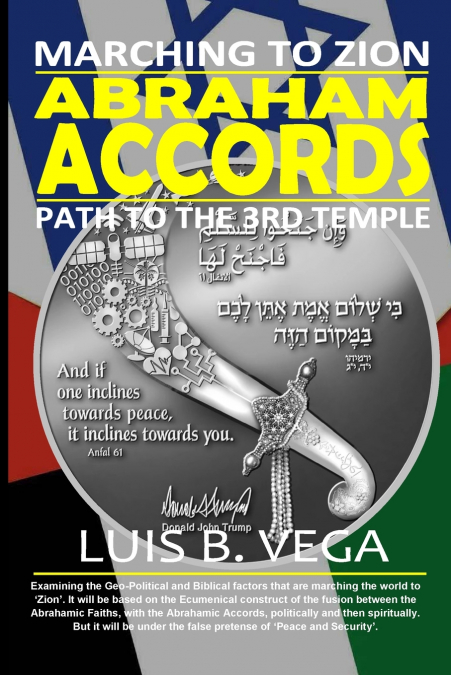
Luis Vega
The purpose of this book is to provide a compilation of write-ups that deal with what the Abraham Accords are. It is based upon the Biblical Covenant made between YHVH, the Creator of the Universe and a Human named Abram from Ur in what is now Iraq. It was in ancient Ur of the Chaldeans that YHVH called Abram out to a Land of Promise and to having multitudes of Descendant, both Earthly and Heavenly. This was the Covenant with Abraham, that upon YHVH changing his name and identity, YHVH promised Abram a better Nation, a Promised Land, a City not built by human hands and a place inside the very House of YHVH, the LORD, as in a Temple. This Abrahamic Covenant was unilateral and unconditional. And upon Abraham accepting the terms, the Bible teaches that because of Abraham taking YHVH at His Word, YHVH bestowed upon him ’Righteousness’ based on the Faith. The Covenant or ’Contract’ or Pack was not based on works but just on the belief of the Promises that GOD does not lie, etc. Although Abraham sojourned through the Promised Land that was called Canaan at the time, it would be his Blood Descendants, through Isaac and Jacob that would possess the Promised Land, Jerusalem and the Temple Mount eventually. That is when the ’Troubles of Jacob’ started. Why? And to that extent, this book will attempt to capture this Trouble of Jacob in the many events and people featured in the chapters. The breakdown is as follows. There will be 7 Sections delineated by a general theme surrounding the topic of the Abraham Accords and what that means, theologically from an Evangelical point of view and interpretation.The Pact with AbrahamThe Punishment of GazaThe Plans for PeaceThe Perils of the ProdigyThe Path to 3rd TempleThe Pilgrim’s PathThe Perplexities of Peace One will examine the specific Biblical details of what the Covenant with Abraham entailed. It will be linked to how it is tagged to the Abraham Accords and why. Then one will present about how 1 of the main contenders to the Covenant with Abraham has been the modern-day Arab Muslims that now call themselves the Palestinians. Lastly, consider purchasing a copy for one’s personal study or to give to others as a gift. Please leave a Review to support this type of Research. Your Patronage is greatly appreciated. The links will be in the endnotes.